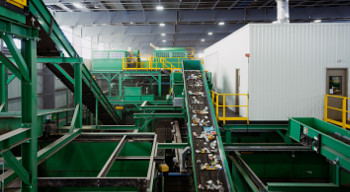Opinion: The Plastic Menace

The All American MRF/Murphy Road Recycling. Photo: Van Dyk Recycling Solutions.

After a recent op-ed piece I wrote questioning the efficacy of plastic recycling, I was invited to tour the USA recycling facility.
Over the years, I’ve seen some very interesting industrial plants: The Sparrow’s Point steel mill at its heyday, at the time the world’s largest, with rivers of molten steel pouring from blast furnace crucibles and red hot ingots being forged into massive I beams; a large national brewery where beer overflow from bottling ran into 2 foot gutters; a spice factory where 1500 pounds of vanilla beans at a time were percolated into extract; a ceramics manufacturer where lab-grade porcelain was fired to a white hot 2700 degrees; various automated production lines handling biological products.
I had not imagined I would be wowed by a recycling facility, that is, until I visited the USA plant (The All American MRF) in northern Connecticut. There, in a building four stories high, a couple blocks long, topped with solar panels, a daily parade of garbage trucks disgorge mountains of glass, metal, paper and plastic that Pioneer Valley residents toss into their blue bins, to be sorted, baled and shipped off as feed stock for re-manufacturing. Giant front-end loaders shovel huge quantities of the debris from our culture of disposable stuff onto a maze of conveyor belts that jiggle, sift, blow, analyze, categorize and separate. There are some humans involved in editing the sorting process at the mind-numbing rate of 60 picks per person per minute as streams of stuff whiz by (an unenviable job even in 40-degree weather), but many fewer than I expected. This state-of-the-art facility, equipped with the latest technology and equipment from Europe (which is years ahead of most of the U.S. recycling industry), manages to untangle the web of discarded junk into four foot cubes and well-sorted bales. Metals, paper, and glass are readily processed and sold as feed stock for reuse in manufacturing, building, or civil engineering. An automated fire suppression system stands ready to put out weekly fires, usually the result of carelessly discarded lithium batteries. The plant is one of the best in the country, the pride of the family and people who run it and a model facility leading the way.
I was also schooled in the politics of local trash collection. There has been a consolidation in the waste hauling industry. Second generation family businesses some may recall, like Amherst Trucking and Dusseau, were sold to other companies when the third generation didn’t want to continue in the businesses. In Amherst,at least three companies vie to service apartment complexes, businesses and colleges, but USA, now a third-generation firm, is one of only a couple that offers to collect recycling curbside from houses, perhaps owing to its ability to collect and sort recycling efficiently.
While some recyclers routinely sort out HDPE and PET (think milk jugs and clear soda and water bottles) and sell these to be re-manufactured, USA manages to capture and sell polypropylene (e.g.: yogurt containers) as well. LDPE, in the form of squeeze bottles, can be captured for resale, but most LDPE is used in films and bags, which are not recyclable. (A staggering 40% of all plastic is used as packaging.) PVC (hard plastic used in plumbing and large plastic items like lawn furniture), polystyrene (used as styrofoam and hard, clear products like CD ‘jewel’ cases), and the mixed bag of more exotic plastics categorized with the number 7, are not recyclable. “Biodegradable plastics” are biodegradable only in commercial composting facilities, and actually hinder recovering other plastics when included in the recycling process.
On one hand, Amherst residents can count themselves lucky to have a waste hauler that is employing state of the art technology to improve efficiency and protect the people directly involved in the process. Our used metal, paper, and glass is being handled relatively effectively. The country would be better off if all waste haulers operated like USA. (For the sake of clarity and full disclosure, I am in no way being compensated for this endorsement.)
On the other hand, we continue to have a plastics problem. USA sells the overwhelming majority of recycled plastics to firms based in the U.S. and uses only domestic disposal options – landfills and waste-to-energy facilities – for the non-recyclable material, which is consoling. There are some promising research discoveries, e.g.: enzymes that can disassemble PET, and meal worms that can feed on styrofoam, both years away from commercial deployment. But some plastics are still not even theoretically recyclable, they are incinerated, buried, or shipped by less scrupulous actors to the poor countries that still accept them. Even for ones that are recycled, each successive iteration of recycling further degrades the plastic, limiting its useful applications, until the degraded stock must ultimately be discarded. Plastics that in theory are reclaimable are usually not recycled in many countries, and even in many regions of the United States, and end up contributing to the plastic stew that circulates in our oceans and the ubiquitous microplastic bits that carry other pollutants with them and are found literally everywhere, from clouds to polar ice to the insides of our bodies.
Plastics were once heralded as the wave of the future. “I have one word for you: plastic. …There’s a great future in plastics. Think about it. Will you think about it?”, was the career advice given to the Dustin Hoffman’s character Ben in the film “The Graduate”. Times do change. Materialism and our culture of rampant disposability are hitting the limits of finite resources and ecosystem collapse unimagined by most people in 1967 when The Graduate was filmed. Now we all need to think about plastics, and it’s not as a career option, but an existential threat. We must now expand the mantra: Reduce. Reuse. Recycle. Add: Rethink. Eliminate.
John Varner is a resident of Amherst’s District 3
